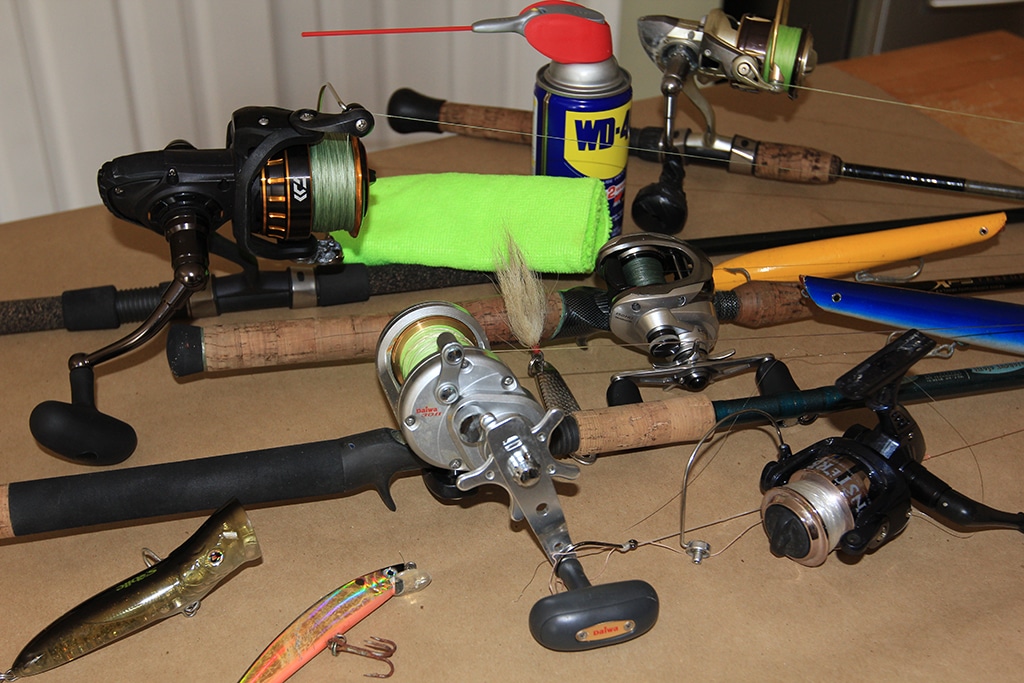Reel Maintenance
Basic upkeep on your saltwater fishing gear will save money in replacements.
There’s little doubt the price of fishing gear has increased significantly in recent years, maybe even more so than other products designed for recreational sport and fun. While there are still plenty of affordable entry-level rod and reel combos that can be found with a visit to your local tackle shop or via an Internet search, more experienced anglers generally lean toward higher-end gear with several different setups required to target a range of popular fish species and fishing environments.
Considering the costs—it’s not unusual for a quality rod and reel setup to run well over $300—it’s never been more important to give your gear a little TLC now and then. Late winter is the perfect time for that endeavor in northern and mid-Atlantic waters while those fishing from the Carolinas south and across to the Gulf Coast might want to simply time serious maintenance sessions to coincide with periods when favored targets are transitioning between seasons.
“It’s amazing how a little cleaning and maintenance extends the life of your tackle,” says John Mantione of J & J Sports in Patchogue, New York, about midway out to Montauk on Long Island’s South Shore. “If you fish marine waters, especially, every rod, reel, and piece of equipment that sees use on a regular basis should get a full inspection, plus some personal attention. That includes nets, gaffs, coolers, pliers, knives—whatever you use that might come in contact with saltwater while you’re out there doing your thing.”
Simply put, says Mantione, “salt kills” when it comes to fishing tackle, so saltwater anglers need to use gear rated for saltwater use. That’s your starting point from which all other care begins with a freshwater washdown after every outing for any rod and reel that might catch even a little spray. At least once a year, he suggests, thoroughly clean and wipe down reels, rinsing them off with freshwater to dissolve the salt, opening the body to replace the grease which often holds sand and grime, checking the drag to make sure it’s functioning smoothly without herky-jerky starts and stops, dropping a spot of oil around the handle, and wiping each down with a clean rag and light touch of WD-40 or similar oil/lubricant to protect the finish. Change the line, too, if it appears worn or has been in use for more than a season or two.
For rods, Mantione suggests starting with a thorough freshwater cleaning and wipe down, followed by inspection of all guides and the rod-tip for grooving from braided lines, rust, nicks, chips, or burrs, all of which can be easily uncovered by running a cotton swab along the guide rings and feet because the threads catch on imperfections.
While yearly cleanings are vital, says Mantione, you can also save a lot of headaches by incorporating basic maintenance into your daily fishing routine. Give rods, reels, nets, and gaffs a quick freshwater washdown as soon as you get back to the dock or park your trailer. Clean your cooler immediately after emptying, and wipe down electronics packages, too, as per manufacturers instructions. Also, be sure to discard any dull, rusty, or bent hooks and make note if you need to buy replacements.
“For reels that don’t work smoothly after home cleaning, a trip to a tackle shop or return to the manufacturer is warranted,” says Mantione. “And there’s nothing wrong with dropping off several rods and reels for professional maintenance, as long as you do so several weeks before needed as repairs can take a while these days given supply chain limitations on replacement parts.
“Maintenance really does make a big difference in how well your gear holds up over time on the saltwater front,” he concludes. “Even with stainless steel products like fishing pliers, a spritz of oil and occasional wipe down can extend life by several years. In the long run, that saves money on replacements.”
More important, it could be the difference between landing the biggest fish you’ve ever seen or telling another “one that got away” story.
-by Tom Schlichter















